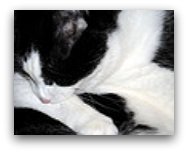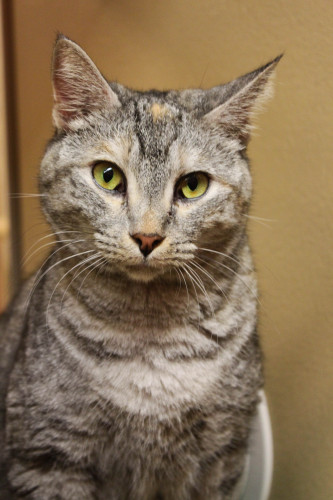Cat Allergies Symptoms and Treatment

Learn more about cat allergies! Like many of us, cats can also suffer from different types of allergies. If you notice your cat itching, scratching or sneezing, it could be signs that your cat’s immune system is overly sensitive to certain objects or substances around your house.
Signs And Symptoms of Cat Allergies
The most common signs of allergies that your cat may show are related to skin, known as allergic dermatitis, which can cause inflammation in the skin. Cats with skin allergies are likely to become itchy and will begin to scratch excessively, which can turn into open sores, inflamed skin and scabs - leading to hair loss.
Cats may also develop respiratory allergies, where signs may mimic upper respiratory infections. The signs of such cat allergies include: runny nose, sneezing and coughing.
Cat allergies may also include the ears. Their ear canals may become inflamed or even infected with yeast and/or bacteria. Symptoms include: hair loss around the ears, scratching at the ears, shaking the head, and odor/discharge from the ears.
Vomiting or diarrhea may be signs of some gastrointestinal upset, where the protein found on their food is most likely to be the cause of such allergic reaction.
Possible Causes of Feline Allergies
Airborne. The same way humans develop allergies to foreign particles in the air, cats and other pets can also be allergic to the different types of allergens. Some of them include pollen from trees, grass and weeds, as well as mold, mildew and dust mites that may be present in your home.
Flea Bites. Many cats suffer from flea bite allergies. The most common areas affected by flea bites are: the rump – near the tail, and the head and neck areas. The flea bite will cause minor irritation on the cat’s skin, and when the cat starts liking the irritated area it will cause it to itch. Some cats may even start chew the irritated area severely, leading to loss of hair, open sores, or scabs on the skin which could in turn lead to a bacterial infection.
Food and treats. There are several types of
cat food
available out there, unfortunately, some of them use
fillers, grains and does not provide the nutritional balance that cats
will need. Most of the time, your cat may develop allergies caused by
the protein component of the food, which can cause digestive disorders
and respiratory problems.
Though Contact. Cats can also show minor allergic reaction from contact with objects, such as flea collar, toys, or pet bedding.
Cat Allergies Treatment And Prevention
Your veterinarian can perform tests to determine what type of allergy your cat is suffering from and the best treatment options, which will depend upon the type of allergy and on the length of the cat's allergy. Your veterinarian may prescribe steroids to be given orally or by injection, which will help to stop the allergic reaction in most cases.
Although steroids can cause unwanted side-effects, so ask your veterinarian for alternative remedies, such as natural remedies and shampoo. Bathing your cat more frequently during seasonal allergies will reduce the amount of antigen exposure and provide some temporary relief from the itching.
Prevention and treatment of flea and other pests can be as simple as applying flea control medicine monthly. If your cat show signs of flea bites allergy, you should start the flea control treatment and, if necessary, your veterinarian can prescribe an anti-bacterial/inflammatory cream to prevent further infection.
If your cat’s allergies are caused by objects or bedding, just remove them from your cat’s contact, if the symptoms persists you should contact your veterinarian for testing and proper treatment.
In addition, be sure to clean your pet’s bedding weekly and vacuum your carpet, rugs, and curtains twice a week, this will help to eliminate dust and reduce your cat’s allergies.
Finally, if your cat is suffering from food or treat allergies, you should change your cat’s diet. There are canned and
solid foods that offer a balanced diet, rich with nutrients and vitamins. Your veterinarian can also recommend a special
diet, and feeding schedule that can help to improve your cat’s digestive system.
Click here for more information about cat allergies.
Related Articles:
Common Cat Allergies You Can Treat Within The Home
Feline Asthma Symptoms and Treatment
Return from Cat Allergies to Our Home Page
New! Comments
Have your say about what you just read! Leave me a comment in the box below.Healthy Cat Treat

Subscribe to Our Love Cats Digest e-zine
"A cat improves the garden wall in sunshine, and the hearth in foul weather." - Judith Merkle Riley
Marketing Strategies by











New! Comments
Have your say about what you just read! Leave me a comment in the box below.